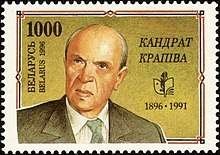Kondrat Krapiva
| Kondrat Krapiva | |
|---|---|
 Krapiva on a 1996 stamp of Belarus | |
| Born |
5 March 1896 Nizok, Minsk Governorate, Belarus |
| Died |
7 January 1991 (aged 94) Minsk, Belarus |
| Occupation | Writer, playwright, critic |
Kondrat Krapiva (Belarusian: Кандрат Крапіва, 5 March 1896 – 7 January 1991) was a Belarusian writer, playwright, social activist, and literary critic. He was the winner of two Stalin Prizes in 1941 and 1951 and winner of the USSR State Prize in 1971. From 1950 he was a member of the Academy of Sciences of the Belorussian SSR. He was a writer for the magazine, "Polymya".[1]
Krapiva served in the Tsarist army from 1915, the Red Army from 1920 to 1923, and was involved in the campaign for the liberation of western Byelorussia in 1939 and the Great Patriotic War (1941–45).[2] His began his literary career in 1922, writing fables, poems, narrative poems, and short stories. Among his notable short stories are The Nettle (1925), Fables (1927), Neighbors (1928), and Live Phenomena (1930). He published the novel The Medvedichi in 1932. He was also a notable playwright, writing plays such as The Partisans (1937), a heroic drama, and He Who Laughs Last (1939), a comedy which earned him the State Prize of the USSR in 1941. Post-war plays include With the People (1948) and People and Devils (1958).[2]
References
| Wikimedia Commons has media related to Kandrat Krapiva. |
- ↑ "Event devoted to the 90th anniversary of the magazine Polymya". National Library of Belarus. Retrieved 8 January 2013.
- 1 2 "Kondrat Krapiva". The Great Soviet Encyclopedia. 1979. Retrieved 8 January 2013.